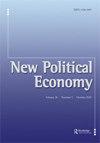南南货币地区主义:一个生产不一致的案例?
IF 3.8
2区 经济学
Q1 ECONOMICS
引用次数: 1
摘要
摘要货币和区域合作机构的多样性往往表现为不均衡、分散和部分竞争。与这种说法相反,Grabel(2018)将赫希曼心态应用于货币和区域合作,强调了最近创新的实验性质,即“生产性不连贯”。本文对这种富有成效的不连贯现象进行了个案研究。我们根据对中央银行工作人员的采访和统计分析,研究了南方共同市场国家之间的本币支付系统(SML)的机构设置。我们评估了解释SML的出现、局限性和体制联系的因素。结果表明,尽管规模很小,但在普遍令人痛苦的南方共同市场中,该机制得到了扩展,并变得非常强大,这是南方共同市场各国央行在数十年来缺乏汇率政策和外汇监管协调后的首次合作。我们的研究结果证实并进一步完善了Grabel的方法:从高度具体和偶然的政策角度评估增量变化是理解机构在发展中发挥作用的关键。我们的结论是,即使是像SML这样的非常小规模的举措,也可以作为改革和变革的基石,为发展性货币和金融治理做出贡献。本文章由计算机程序翻译,如有差异,请以英文原文为准。
South-South monetary regionalism: a case of productive incoherence?
ABSTRACT The variety of monetary and regional cooperation institutions often is characterised as uneven, fragmented, and partially contested. In contrast to this narrative, Grabel (2018) applies a Hirschmanian mindset to monetary and regional cooperation that highlights the experimental nature of recent innovations as a ‘productive incoherence’. This paper presents a case study of such productive incoherence. We examine the institutional set up of the Local Currency Payments System (SML) between the Mercosur countries based on interviews with Central Bank staff and statistical analysis. We assess the factors that explain the emergence, limitations and institutional linkages of the SML. The results suggest that, despite its small scale, the mechanism expanded and provided to be remarkably robust in midst of a generally agonising Mercosur, representing the first cooperation between the Mercosur central banks after decades of absence of coordination of exchange rate policy and foreign exchange regulation. Our findings confirm and further refine Grabel’s approach: assessing incremental changes in terms of highly specific and contingent policies is key to understanding the role institutions play for development. We conclude that even very small-scale initiatives such as the SML can contribute to developmental monetary and financial governance as a building block of reform and change.
求助全文
通过发布文献求助,成功后即可免费获取论文全文。
去求助
来源期刊

New Political Economy
Multiple-
CiteScore
10.10
自引率
9.50%
发文量
41
期刊介绍:
New Political Economy aims to create a forum for work which combines the breadth of vision which characterised the classical political economy of the nineteenth century with the analytical advances of twentieth century social science. It seeks to represent the terrain of political economy scholarship across different disciplines, emphasising original and innovative work which explores new approaches and methodologies, and addresses core debates and issues of historical and contemporary relevance.
 求助内容:
求助内容: 应助结果提醒方式:
应助结果提醒方式:


